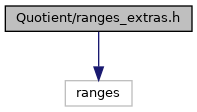 |
libQuotient
A Qt library for building matrix clients
|
 |
libQuotient
A Qt library for building matrix clients
|
#include <algorithm>#include <ranges>
Go to the source code of this file.
Namespaces | |
| namespace | Quotient |
Functions | |
| template<typename RangeT , typename ValT , typename ProjT = std::identity> requires std::indirectly_comparable<std::ranges::iterator_t<RangeT>, const ValT*, std::ranges::equal_to, ProjT> | |
| constexpr auto | Quotient::findIndex (const RangeT &range, const ValT &value, ProjT proj={}) |
| An indexOf() alternative for any range. | |
| template<class TargetT , typename SourceT > | |
| constexpr auto | Quotient::rangeTo (SourceT &&sourceRange) |
| A replacement of std::ranges::to() while toolchains catch up. | |
| constexpr auto | Quotient::rangeContains (const auto &c, const auto &v, auto proj) |